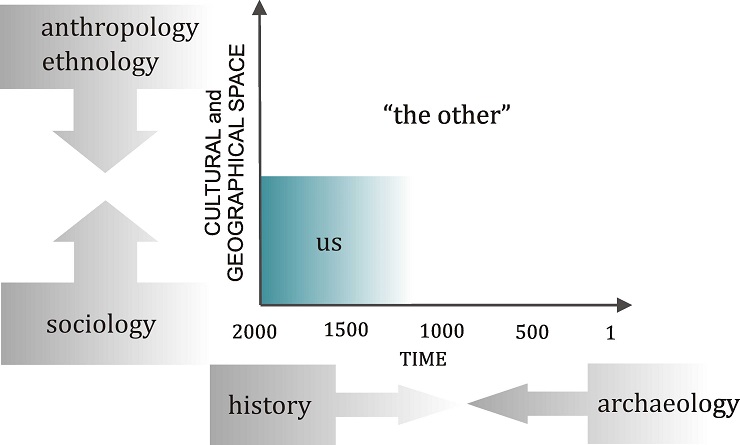History described its narrative concept usually follows a timeline. Archaeology also respects the same rule, though it is not able to pin-down fixed points in the form of mere facts. Instead, it uses a schema in which each era of human history that can be defined based on certain specific parameters has a beginning, a development, a climax, a trailing-off period and an ending that foreshadows the emergence of another era. If we cleave to the established scheme, we should start the story of the Neolithic with the moment at which the first indications appear in the archaeological record that the previous era of the hunter-gatherer manner of obtaining food had begun to change.
|
|
| The definitions of us and “the others” in the study of culture. |
The ones about whom we want to provide information, however, were totally different than we are, however. Their differences did not stem from the types of houses in which they lived nor from the appearance of the stone tools that they used. Their otherness was based on their culture, which should be understood as a constituting a complex and interconnected set of mental templates for their perception of the world. The concept of culture refers to a historically passed pattern of meanings contained in symbols, a system of inherited concepts expressed in symbolic form, and as the means by which people communicate, maintain and develop their knowledge of life and their attitude towards it.
If we are searching for the Neolithic world we must realise that this was primarily a part of the mindset of the people of that time. And it is the forte of anthropology to penetrate ways of thinking and resultant behaviour of these archaic humans. Why is this? Because it was born of the incipient recognition that beyond the horizon of the western world there exists a colourful and diverse kaleidoscope of other human societies.
Want to learn more?
- Fabian, J. 1983. Time and the Other: How Anthropology Makes Its Object. New York: Columbia University Press.
- Geertz, C. 1975. The interpretation of cultures: selected essays. London: Hutchinson.
- Schneebaum, T. 1969. Keep the river on your right. New York: Grove Press.
- Todorov, T. 1984. The conquest of America: the question of the other. 1st ed. New York: Harper & Row.
 Archeologické 3D virtuální muzeum
Archeologické 3D virtuální muzeum

.jpg)
